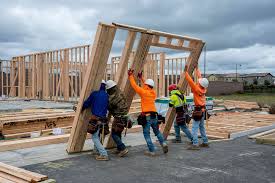
Homebuilders pulled more permits but started fewer homes in March as the U.S. housing market faced mounting pressure from high mortgage rates, elevated prices, and fresh uncertainty over potential import tariffs.
According to data released Thursday by the U.S. Census Bureau, housing permits were issued at an annualized rate of 1.48 million in March, representing a 1.6% increase from February. However, the number of housing starts dropped significantly to an annual rate of 1.32 million — down 11.4% from the previous month.

The mixed data reflects ongoing volatility in the housing sector. Builders continue to struggle with the ripple effects of inflation, persistent labor shortages, and concerns over economic policy — particularly surrounding the Biden administration's evolving stance on tariffs, which echoes previous challenges during the Trump era.
“Net, net, housing starts are down in March, but despite the confusion on construction costs posed by the administration’s tariff policy, and the general pessimism of home builders, single-family home permits remain remarkably steady,” said Chris Rupkey, chief economist at FWDBonds.
Although permit issuance has remained stable, many in the industry are wary of what lies ahead. Tariffs — particularly on critical materials like lumber and metals — have already driven up building costs, with builders estimating that they could add as much as $9,000 or more to the price of a new home.
The National Association of Home Builders (NAHB) noted on Wednesday that confidence among builders ticked up slightly in April, but overall sentiment remains low. “The recent dip in mortgage rates may have pushed some buyers off the fence in March, helping builders with sales activity,” said NAHB Chairman Buddy Hughes, a home builder and developer from Lexington, North Carolina. “At the same time, builders have expressed growing uncertainty over market conditions as tariffs have increased price volatility for building materials at a time when the industry continues to grapple with labor shortages and a lack of buildable lots.”
Adding to the uncertainty, Federal Reserve Chairman Jerome Powell warned that tariffs could have broader inflationary effects, making it more difficult for the central bank to manage interest rates. During remarks at the Society for Advancing Business Editing and Writing (SABEW) Annual Conference, Powell said tariffs could lead to “persistent inflation,” sparking concerns that the Fed may be forced to raise rates again.
Meanwhile, other sectors of the economy showed signs of resilience. The Census Bureau reported a 1.4% rise in retail sales for March, bolstered by strong activity in car and auto parts sales — a trend analysts say may be due to consumers trying to beat impending tariffs on imported vehicles.
While the broader economy remains relatively strong, the housing market continues to be weighed down by long-term structural challenges and short-term policy uncertainty. Builders are bracing for a potentially rocky spring and summer as they await clarity on tariffs, interest rates, and the overall economic outlook.
Originally reported by Tim Smart in US News.